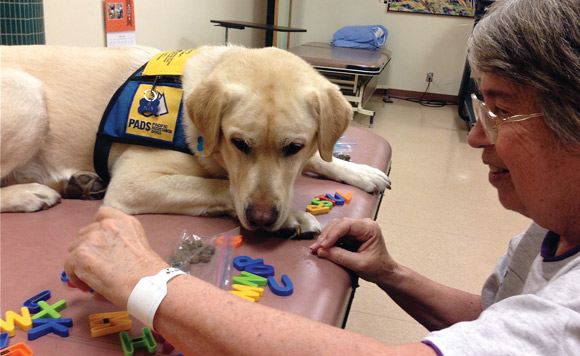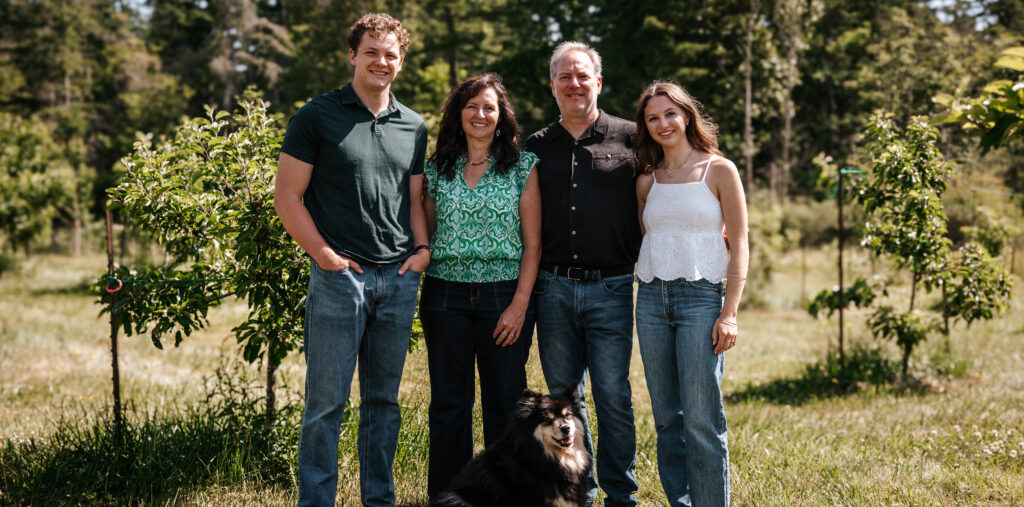by Hans Tammemagi –
The smile on George’s face lights up the entire room. A senior who suffers from cognitive impairment, he has just arrived for a physiotherapy session with Lisa Markin, a registered nurse. Her assistant, Cajun, an adorable five-year-old golden Labrador, greets George by enthusiastically licking his face, and George loves every wet kiss.
Over the next hour George is led through a series of physio exercises designed to help him relearn motor control and basic life tasks like feeding himself and dressing. When he throws a coloured ball at a bin and misses, Cajun returns the ball for another try. George is asked to move three kibbles from one bowl to Cajun’s bowl. When the task has been completed, Cajun gets to eat the kibble, but only after George gives the command. A close bond has developed between the man and the dog, and it is easy to see that George maintains interest and tries harder because of Cajun.
The value of pets in medical situations and to help seniors is recognized because they make it fun to do therapy that otherwise is boring and difficult. It also removes stress and anxiety and offers good companionship. Studies show that interacting with a dog can lower blood pressure, calm people who are agitated, refresh confused minds, release strains and tension and ease feelings of loneliness and depression.
In the Victoria area, St. John Ambulance and Pacific Animal Therapy Society operate programs where volunteers bring their pets to hospitals and nursing homes and spend time with the patients and residents.
Lisa, however, has taken this concept a huge step farther. In 2008, after 18 years as a nurse, she was looking for a change and was inspired by a TV program about animal-assisted therapy. Nothing was available in Canada so she took a one-year certification course in Chicago. She and her husband bought a dog, Rowan, who had been especially selected and trained since a puppy to assist with therapy. Rowan went through an additional rigorous nine-week certification course with Pacific Assistance Dogs, from which only half the dogs graduate. Lisa started to offer animal assisted therapy through her company, INSPIRE, and discovered there was a demand for this service.
Her business took off in 2012, when clinical trials were piloted at Aberdeen Hospital and proved very successful. Because provincial health care provides no support, Eldercare Foundation stepped up and sponsors the program through volunteer-raised funding.
Lisa stresses that animal-assisted therapy (AAT) is far more than the social interaction offered by visiting dog programs. AAT is a goal-orientated client-specific procedure for which both the dog and nurse have specialized training. The interactions are documented and evaluated just like any other nursing care.
The AAT program has proven hugely effective. Barbara MacDonald, the Program Coordinator for West Shore Adult Day Program, says: “It brought tears to my eyes to see the residents of Aberdeen Hospital respond to Rowan in such an engaged way. I knew some of these residents and was amazed to see how motivated they were to do activities with the dog. One man I remembered had not used his hands or feet since his injury several years before and there he was kicking at a ball and moving his hands to reach a treat for the dog. I asked immediately if we could get this for our clients.” There are numerous other happy success stories.
These programs work because therapy dogs are completely accepting of people, offer unconditional affection and instinctively understand when someone needs comfort. Most importantly, though, therapy dogs are selected for their personality and then receive extensive training.
For example, Cajun, who replaced Rowan who retired recently, knows 55 commands, can open/shut doors, turn lights on/off and can help people get dressed. Cajun is very passive and adapted to crowds and noise and can cope with cars, buses, trains and other means of transportation.
Lori S. McLeod, Executive Director, Eldercare Foundation, says: “The animal-assisted therapy program is so successful that we’re looking for ways to expand it.”
For more information visit INSPIRE at www.inspireaat.com or Eldercare Foundation at www.gvef.org.




